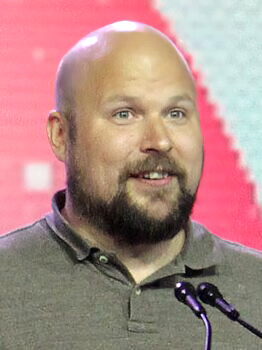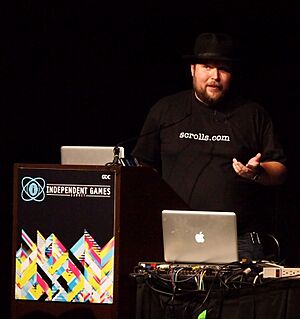Markus Persson facts for kids
Quick facts for kids
Markus Persson
|
|
|---|---|

Persson at the 2016 Game Developers Conference
|
|
| Born |
Markus Alexej Persson
1 June 1979 Stockholm, Sweden
|
| Other names | Notch |
| Occupation | |
| Years active | 2004–present |
|
Notable work
|
Minecraft |
| Title | Founder of Mojang Studios |
| Spouse(s) |
Elin Zetterstrand
(m. 2011; div. 2012) |
| Children | 1 |
Markus Alexej Persson (born June 1, 1979), also known as Notch, is a Swedish video game programmer and designer. He is famous for creating Minecraft, which is the best-selling video game ever. In 2009, he started the video game company Mojang Studios.
Persson began making video games when he was very young. He became successful after releasing an early version of Minecraft in 2009. Before the game was officially released in 2011, it had already sold over ten million copies. After this, Persson stepped down as the main designer and gave his creative role to Jens Bergensten. In September 2014, Persson announced he felt he had "become a symbol" and did not want to be in charge of Mojang's growing operations. He left Mojang in November of that year, selling his company to Microsoft for about US$2.5 billion. This made him a billionaire.
Since 2016, some of Persson's posts on Twitter about social topics have caused public discussions. In 2019, Microsoft criticized his posts. They later removed mentions of his name from Minecraft (except in the game's end credits). He was also not invited to the game's tenth anniversary celebration. In 2015, he co-founded a game studio called Rubberbrain, which was relaunched in 2024 as Bitshift Entertainment.
Contents
Early Life and Gaming Beginnings
Markus Alexej Persson was born in Stockholm, Sweden, on June 1, 1979. He grew up in Edsbyn until he was seven, then his family moved back to Stockholm. He enjoyed spending time outdoors and exploring the woods with friends.
Persson became interested in video games at a young age. His father taught him how to use their family computer, a Commodore 128. On this computer, Persson played games and typed in programs from magazines. He started programming on his father's computer when he was seven. He made his first game, a text-based adventure, when he was eight.
By 1994, Persson knew he wanted to be a video game developer. He studied graphic design from ages 15 to 18. He spent most of his free time at home playing games and programming. He even figured out how the Doom game engine worked, which he was very proud of. He was a good student but did not finish high school.
Career Journey
Persson started his career as a web designer. He later worked at Game Federation, where he met Rolf Jansson. They worked together in their free time to create the 2006 video game Wurm Online. Persson left this project in late 2007.
Between 2004 and 2009, Persson worked as a game developer for Midasplayer, which later became King. He mostly programmed browser games using Flash. After that, he worked as a programmer for jAlbum.
Creating Minecraft and Mojang
Before Minecraft, Persson made many small games. He also entered game design competitions and talked with other independent game developers online.
How Minecraft Was Inspired
One of Persson's projects was called RubyDung. It was a 3D building game. While working on RubyDung, he tried a first-person view, but thought the graphics were too blocky.
In 2009, Persson found inspiration from Infiniminer. This was a block-based mining game where players could build freely. Infiniminer greatly influenced his work on RubyDung. It made him bring back the first-person view, the blocky look, and the idea of building with blocks. RubyDung is known as the very first version of Minecraft.
Minecraft Release and Huge Success
On May 17, 2009, Persson released the first version of Minecraft online. He updated the game often based on feedback from players. He released several new versions throughout 2009 and 2010. On June 30, 2010, he released the game's Alpha version.
While working on Minecraft, Persson also worked at jAlbum. In 2010, after Minecraft became very popular, he changed to part-time work at jAlbum. He left jAlbum later that year.
In September 2010, Persson visited Valve Corporation and was offered a job. He turned it down to keep working on Minecraft.
On December 20, 2010, Minecraft entered its beta phase and started coming out on other devices. By January 2011, Minecraft had one million registered players. Six months later, it reached ten million. Mojang held the first Minecon event in November 2011 to celebrate the game's full release. After this, on December 11, 2011, Persson gave control of Minecraft's development to Jens Bergensten. He then started working on a new game called 0x10c, but he stopped working on it around 2013.
In 2013, Mojang made $330 million in revenue and $129 million in profit.
Why Persson Left Mojang
Persson said that the huge amount of media attention and public pressure made him tired of managing Minecraft and the company.
In June 2014, Persson jokingly tweeted if anyone wanted to buy his share of Mojang. He owned 71% of the company at the time. This offer got a lot of interest from big companies like Activision Blizzard, EA, and Microsoft.
In September 2014, Microsoft agreed to buy Mojang for $2.5 billion. This sale made Persson a billionaire. He left the company after the deal was completed in November.
What Persson Did After Mojang
Since leaving Mojang, Persson has worked on several small projects. On June 23, 2014, he started a company called Rubberbrain AB. This company was relaunched as Bitshift Entertainment, LLC on March 28, 2024. Persson has also shown interest in creating a new video game studio and developing virtual reality games. He has also created special immersive events called ".party()", which use many visual effects.
In early 2025, Persson thought about making a new game similar to Minecraft, sometimes called "Minecraft 2". However, after talking with his team, he decided to develop a different game instead, a roguelike game called Levers and Chests.
Games Created by Markus Persson
Minecraft
Persson's most famous game is the survival sandbox game Minecraft. It was first available on May 17, 2009, and fully released on November 18, 2011. Persson left his job to work on Minecraft full-time. In early 2011, Mojang sold its one millionth copy of the game. Mojang hired more staff for the Minecraft team, and Persson passed the main developer role to Jens Bergensten. He stopped working on Minecraft after selling Mojang to Microsoft for $2.5 billion.
Caller's Bane
Persson and Jakob Porsér came up with the idea for Scrolls. This game combined elements from board games and collectible card games. Persson was not actively involved in developing this game; Porsér led its creation. In 2011, Persson announced that he was being sued by a law firm representing Bethesda Softworks. They claimed the name Scrolls was too similar to their The Elder Scrolls game series. The lawsuit was settled in March 2012, allowing Mojang to keep using the Scrolls name. In 2018, Scrolls became free to play and was renamed Caller's Bane.
Cliffhorse
Cliffhorse is a funny game Persson programmed in just two hours. He used the Unity game engine and free art. The game was inspired by the physics in Skyrim and other humorous games. It was released for Microsoft Windows systems in 2014. Players were asked to donate Dogecoin to "buy" the game before downloading it. The game collected over 280,000 Dogecoins.
0x10c
After his involvement with Minecraft ended, Persson started working on a space game in March 2012. On April Fools' Day, Mojang launched a joke website for "Mars Effect" (a parody of Mass Effect). However, the actual game, 0x10c (pronounced "Ten to the C"), was revealed on April 4. It was planned as a space sandbox game. Persson officially stopped making the game in August 2013. However, C418, who composed music for both 0x10c and Minecraft, released an album of the music he had made for the game.
Shambles
In 2013, Persson made a free game called Shambles using the Unity game engine.
Ludum Dare Games
Persson has also taken part in several Ludum Dare competitions, where developers make games in 48 hours.
- Breaking the Tower was a game he made for Ludum Dare No. 12. In this game, players gather resources, build, and train soldiers to destroy a large tower on an island.
- Metagun is a 2D platformer created for Ludum Dare No. 18.
- Prelude of the Chambered was made for Ludum Dare No. 21. It is a short first-person dungeon crawler game.
- Minicraft was developed for Ludum Dare No. 22 in December 2011. It is a small top-down survival game similar to Zelda and influenced by Minecraft. It was written in Java.
Personal Life
In 2011, Persson married Elin Zetterstrand. They had a daughter together. On August 15, 2012, he announced that he and his wife had filed for divorce, which was finalized later that year.
Persson has shared that he has experienced periods of sadness and changing moods.
He has expressed his views on game piracy, stating that "piracy is not theft". He believes that unauthorized downloads can lead to future customers.
Persson has donated to many charities, including Médecins Sans Frontières (Doctors Without Borders). Under his guidance, Mojang spent a week developing Catacomb Snatch for the Humble Bundle and raised US$458,248 for charity. He also donated $250,000 to the Electronic Frontier Foundation in 2012. In 2011, he gave $3 million in extra earnings back to Mojang employees.
According to Forbes, his net worth in 2023 was around $1.2 billion. In 2014, Persson was one of the biggest taxpayers in Sweden. Around 2014, he lived in a large apartment in Östermalm, Stockholm. In December 2014, Persson bought a home in Trousdale Estates, Beverly Hills, California, for $70 million. This was a record sales price for Beverly Hills at the time.
Social Media Discussions
Persson began receiving attention for his political and social opinions shared on social media starting in 2016.
In 2017, he made a suggestion about a "heterosexual pride holiday" and later clarified his comments. He also tweeted about feminism and other social topics. In 2019, he tweeted about transgender-rights issues, which also led to discussions. He later clarified his thoughts, saying he found it "inspiring as hell when people open up and choose to actually be who they know themselves as."
In 2019, Microsoft removed two mentions of Persson's name from a Minecraft update. They also did not invite him to the game's 10-year anniversary celebration. A spokesperson for Microsoft stated that his views "do not reflect those of Microsoft or Mojang."
Awards
| Year | Nominated work | Category | Award | Result | Notes | Ref. |
|---|---|---|---|---|---|---|
| 2011 | Minecraft | Best Debut Game, Innovation Award, Best Downloadable Game | Game Developers Choice Awards | Won | ||
| 2012 | Minecraft | BAFTA Special Award | BAFTA | Won | ||
| 2016 | Minecraft | Pioneer Award Winner | Game Developers Choice Awards | Won | Award formerly known as the First Penguin Award |
See also
 In Spanish: Markus Persson para niños
In Spanish: Markus Persson para niños
 | Bessie Coleman |
 | Spann Watson |
 | Jill E. Brown |
 | Sherman W. White |


